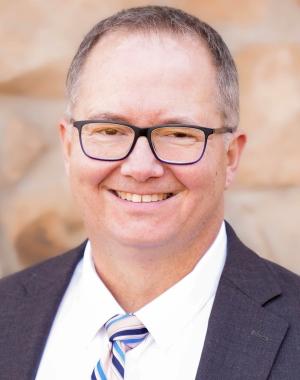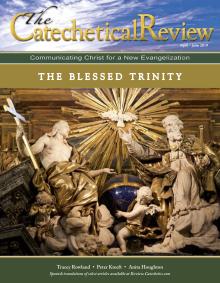 In what is perhaps the most foundational statement in all the Catechism of the Catholic Church, we read something puzzling: “The ultimate end of the whole divine economy is the entry of God's creatures into the perfect unity of the Blessed Trinity.”[1] We can easily embrace the part about God, but what about God’s creatures entering into the “perfect unity of the Trinity”? We human creatures are rather riddled with flaws and deficiencies. How do such as we—inconsistent and sinful as we are—enter into perfect Trinitarian life? The Catechism insists that this is the reason why God made us. In another place, the text describes the “innermost secret” of the Blessed Trinity: “God himself is an eternal exchange of love, Father, Son, and Holy Spirit, and he has destined us to share in that exchange.”[2] Out of sheer, infinite generosity, God created you and me so that we could participate forever in this exchange of divine love, which will be the essence of heaven. The Second Vatican Council describes holiness as “the perfection of charity.”[3] Holiness, then, is not to be understood merely as “supercharged piety,” but rather our prayers and sacramental life are meant to increase our capacity for sacrificial love. Consequently, pursuing holiness will require suffering on our part, on account of the sacrifice that such love entails. Turning to the Scriptures, we remember the Lord’s response to the rich young man, who desired to join himself to Christ as his disciple. In response to the question, “What must I do to inherit eternal life?” Jesus responded by demanding the concrete expression of divine love as it could be best revealed in this man’s life: “Sell all that you have and distribute it to the poor” (Lk 18:18-22). In other words, being my disciple requires you to give everything, to hold nothing back. While many today might say they live their Christianity by “trying to be a good person,” what is actually required of us is something infinitely greater: the highest kind of love. After all, Christ himself said to us, “This is my command: love one another as I love you” (Jn 15:12). Entering into God’s way of loving means that our way of loving must be conformed to his. While such an endeavor is the work of a lifetime, how is such an objective even attainable? If you’re anything like me, then you’re probably falling short of this ideal. So, how do we get there—from here? God gives us everything we need through the liturgy. Many Catholics look to the liturgy as the “place” where we receive grace. It is certainly this; and it is this grace, God’s very divine life, which conforms us to Love Incarnate. However, the liturgy is not only about receiving grace; it is also a school of divine love, an encounter with God where we learn the practice of giving and receiving divine love. Jeremy Driscoll, OSB explains that within the liturgy there are two great movements: first, from God the Father to the world and, second, from the world back to God the Father.[4] Out of love the Father gives himself, in the person of his dearly beloved Son, made manifest to us through the power of the Holy Spirit in two ways: first, through his revelation of himself proclaimed in the Liturgy of the Word; second, through the unthinkable gift of Christ in his Paschal Mystery, whom we receive under the appearances of bread and wine in Holy Communion. The Mass also changes us when we approach our worship as the giving of a gift to our Heavenly Father. Setting aside the time for Mass is a very basic gift. This gift of self becomes more real, more substantial when we invest ourselves into truly praying the Mass. Just as the Father gives us Jesus in this unique encounter, so do we offer Jesus back to the Father as a sacrificial offering. We unite the gift of ourselves to that most sacred sacrifice, thereby offering all of who we are in love to the Father. Taking a step back, we can see that the Mass is far from a superficial ritual. When we see it through the lens of self-giving love, we can begin to earnestly receive from God what he wants to give us. And we can return that gift by giving all of ourselves as we offer Christ back to the Father. In these extraordinary downwards and upwards movements, not only do we receive grace, but we are prepared for heaven, conformed and perfected through this foretaste of the love of God. Dr. James Pauley is Professor of Theology and Catechetics at Franciscan University of Steubenville and author of Liturgical Catechesis in the 21st Century: A School of Discipleship (Liturgy Training Publications, 2017).
In what is perhaps the most foundational statement in all the Catechism of the Catholic Church, we read something puzzling: “The ultimate end of the whole divine economy is the entry of God's creatures into the perfect unity of the Blessed Trinity.”[1] We can easily embrace the part about God, but what about God’s creatures entering into the “perfect unity of the Trinity”? We human creatures are rather riddled with flaws and deficiencies. How do such as we—inconsistent and sinful as we are—enter into perfect Trinitarian life? The Catechism insists that this is the reason why God made us. In another place, the text describes the “innermost secret” of the Blessed Trinity: “God himself is an eternal exchange of love, Father, Son, and Holy Spirit, and he has destined us to share in that exchange.”[2] Out of sheer, infinite generosity, God created you and me so that we could participate forever in this exchange of divine love, which will be the essence of heaven. The Second Vatican Council describes holiness as “the perfection of charity.”[3] Holiness, then, is not to be understood merely as “supercharged piety,” but rather our prayers and sacramental life are meant to increase our capacity for sacrificial love. Consequently, pursuing holiness will require suffering on our part, on account of the sacrifice that such love entails. Turning to the Scriptures, we remember the Lord’s response to the rich young man, who desired to join himself to Christ as his disciple. In response to the question, “What must I do to inherit eternal life?” Jesus responded by demanding the concrete expression of divine love as it could be best revealed in this man’s life: “Sell all that you have and distribute it to the poor” (Lk 18:18-22). In other words, being my disciple requires you to give everything, to hold nothing back. While many today might say they live their Christianity by “trying to be a good person,” what is actually required of us is something infinitely greater: the highest kind of love. After all, Christ himself said to us, “This is my command: love one another as I love you” (Jn 15:12). Entering into God’s way of loving means that our way of loving must be conformed to his. While such an endeavor is the work of a lifetime, how is such an objective even attainable? If you’re anything like me, then you’re probably falling short of this ideal. So, how do we get there—from here? God gives us everything we need through the liturgy. Many Catholics look to the liturgy as the “place” where we receive grace. It is certainly this; and it is this grace, God’s very divine life, which conforms us to Love Incarnate. However, the liturgy is not only about receiving grace; it is also a school of divine love, an encounter with God where we learn the practice of giving and receiving divine love. Jeremy Driscoll, OSB explains that within the liturgy there are two great movements: first, from God the Father to the world and, second, from the world back to God the Father.[4] Out of love the Father gives himself, in the person of his dearly beloved Son, made manifest to us through the power of the Holy Spirit in two ways: first, through his revelation of himself proclaimed in the Liturgy of the Word; second, through the unthinkable gift of Christ in his Paschal Mystery, whom we receive under the appearances of bread and wine in Holy Communion. The Mass also changes us when we approach our worship as the giving of a gift to our Heavenly Father. Setting aside the time for Mass is a very basic gift. This gift of self becomes more real, more substantial when we invest ourselves into truly praying the Mass. Just as the Father gives us Jesus in this unique encounter, so do we offer Jesus back to the Father as a sacrificial offering. We unite the gift of ourselves to that most sacred sacrifice, thereby offering all of who we are in love to the Father. Taking a step back, we can see that the Mass is far from a superficial ritual. When we see it through the lens of self-giving love, we can begin to earnestly receive from God what he wants to give us. And we can return that gift by giving all of ourselves as we offer Christ back to the Father. In these extraordinary downwards and upwards movements, not only do we receive grace, but we are prepared for heaven, conformed and perfected through this foretaste of the love of God. Dr. James Pauley is Professor of Theology and Catechetics at Franciscan University of Steubenville and author of Liturgical Catechesis in the 21st Century: A School of Discipleship (Liturgy Training Publications, 2017).
Notes
This article originally appeared on page 5 of the printed edition. Triquetra public domain image by Peter Lomas at Pixabay.com
This article is from The Catechetical Review (Online Edition ISSN 2379-6324) and may be copied for catechetical purposes only. It may not be reprinted in another published work without the permission of The Catechetical Review by contacting [email protected]


















